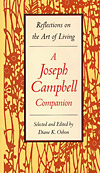
Reflections on the Art of Living: A Joseph Campbell Companion
Edited by Diane K. Osbon
This is a collection of some of Joseph Campbell's best writings. His ideas—what I think of as the tools of coping—have stood me in very good stead. For instance, I try to say yes to life no matter what. I also try to acknowledge, as Campbell wrote, "The world is perfect. It's a mess. It has always been a mess. … Our job is to straighten out our own lives." His most famous advice is "Follow your bliss." Some people take that to mean that if you do what makes you happy, you will be rich and carefree. But what Campbell said was "If you follow your bliss, you will always have your bliss. … If you follow money, you may lose it, and you will have nothing."
Edited by Diane K. Osbon
This is a collection of some of Joseph Campbell's best writings. His ideas—what I think of as the tools of coping—have stood me in very good stead. For instance, I try to say yes to life no matter what. I also try to acknowledge, as Campbell wrote, "The world is perfect. It's a mess. It has always been a mess. … Our job is to straighten out our own lives." His most famous advice is "Follow your bliss." Some people take that to mean that if you do what makes you happy, you will be rich and carefree. But what Campbell said was "If you follow your bliss, you will always have your bliss. … If you follow money, you may lose it, and you will have nothing."
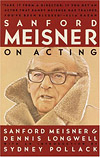
Sanford Meisner on Acting
By Sanford Meisner and Dennis Longwell
When I started acting, I didn't quite get it: I thought you had "it" or you didn't. A year or so after I'd dropped out of high school, my mother came to see me in some ghastly off-off Broadway play. She said that if I was going to be an actor, I should study. It was a criticism, yes, but it was said in a supportive way. I took a lot of classes and didn't do very well—I was scared and very resistant to working hard. Reading this book was an epiphany. Meisner taught a method he called the magic "as if." The gist of it is figuring out how I—Rob Morrow—connect emotionally to the story I'm acting. Using the technique, I stopped just saying words and doing gestures and started to try to inhabit roles. It helped me fall in love with the art of acting.
By Sanford Meisner and Dennis Longwell
When I started acting, I didn't quite get it: I thought you had "it" or you didn't. A year or so after I'd dropped out of high school, my mother came to see me in some ghastly off-off Broadway play. She said that if I was going to be an actor, I should study. It was a criticism, yes, but it was said in a supportive way. I took a lot of classes and didn't do very well—I was scared and very resistant to working hard. Reading this book was an epiphany. Meisner taught a method he called the magic "as if." The gist of it is figuring out how I—Rob Morrow—connect emotionally to the story I'm acting. Using the technique, I stopped just saying words and doing gestures and started to try to inhabit roles. It helped me fall in love with the art of acting.
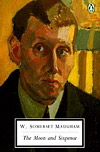
The Moon and Sixpence
By W. Somerset Maugham
Maugham used the life of Paul Gauguin as the basis for this novel. The character of Charles Strickland, like Gauguin, is a banker who feels compelled to create art even though it's going to destroy his family. I read this book just as I was getting serious about acting, and for that reason, it was very important to me. Maugham's prose is beautiful and economical—he didn't need to show off. He just needed to tell his story and reveal his characters and explore his big question: What is genius?
By W. Somerset Maugham
Maugham used the life of Paul Gauguin as the basis for this novel. The character of Charles Strickland, like Gauguin, is a banker who feels compelled to create art even though it's going to destroy his family. I read this book just as I was getting serious about acting, and for that reason, it was very important to me. Maugham's prose is beautiful and economical—he didn't need to show off. He just needed to tell his story and reveal his characters and explore his big question: What is genius?
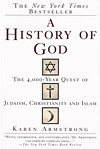
A History of God
By Karen Armstrong
I had a pretty perfunctory Jewish upbringing and came to adulthood with a lot of questions about religion. A few years ago, Doug Rushkoff, author of Nothing Sacred, wrote an op-ed for The New York Times about Judaism that made me understand so much about that faith. We've since become friends, and he recommended this book to me. It traces the way humans have created divine narratives and how the beliefs inspired by those narratives have enabled us to survive. The book takes a lot of the mystery away, but it also helped me put the idea of God into perspective and made me think about my daughter, specifically how I'm going to help this person along in her life.
By Karen Armstrong
I had a pretty perfunctory Jewish upbringing and came to adulthood with a lot of questions about religion. A few years ago, Doug Rushkoff, author of Nothing Sacred, wrote an op-ed for The New York Times about Judaism that made me understand so much about that faith. We've since become friends, and he recommended this book to me. It traces the way humans have created divine narratives and how the beliefs inspired by those narratives have enabled us to survive. The book takes a lot of the mystery away, but it also helped me put the idea of God into perspective and made me think about my daughter, specifically how I'm going to help this person along in her life.
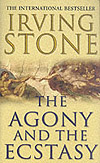
The Agony and the Ecstasy
By Irving Stone
I picked up this fictionalized account of Michelangelo's life while traveling in Europe. Stone creates an epic story about the artist's struggle to be understood as the master he was. Michelangelo had to work for warring popes and princes, some of whom kept him away from marble, his favorite medium, by commissioning him to paint. By the time he was free to carve the kind of statues he was passionate about, he was old and sick. Stone writes that Michelangelo believed his sculptures existed fully formed inside the marble, and his job was simply to get them out. It's a metaphor I've since used when acting, writing, or directing.
By Irving Stone
I picked up this fictionalized account of Michelangelo's life while traveling in Europe. Stone creates an epic story about the artist's struggle to be understood as the master he was. Michelangelo had to work for warring popes and princes, some of whom kept him away from marble, his favorite medium, by commissioning him to paint. By the time he was free to carve the kind of statues he was passionate about, he was old and sick. Stone writes that Michelangelo believed his sculptures existed fully formed inside the marble, and his job was simply to get them out. It's a metaphor I've since used when acting, writing, or directing.




